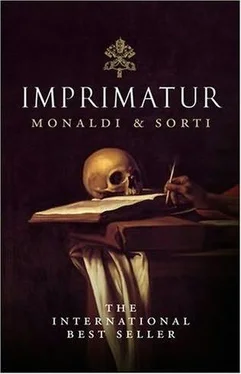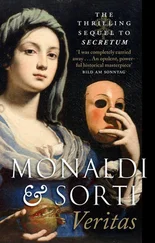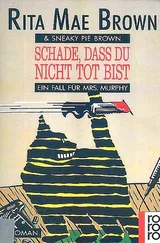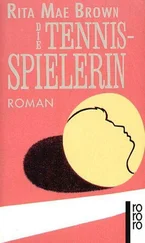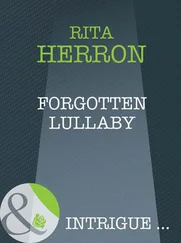Rita Monaldi - Imprimatur
Здесь есть возможность читать онлайн «Rita Monaldi - Imprimatur» весь текст электронной книги совершенно бесплатно (целиком полную версию без сокращений). В некоторых случаях можно слушать аудио, скачать через торрент в формате fb2 и присутствует краткое содержание. Жанр: Исторический детектив, на английском языке. Описание произведения, (предисловие) а так же отзывы посетителей доступны на портале библиотеки ЛибКат.
- Название:Imprimatur
- Автор:
- Жанр:
- Год:неизвестен
- ISBN:нет данных
- Рейтинг книги:5 / 5. Голосов: 1
-
Избранное:Добавить в избранное
- Отзывы:
-
Ваша оценка:
- 100
- 1
- 2
- 3
- 4
- 5
Imprimatur: краткое содержание, описание и аннотация
Предлагаем к чтению аннотацию, описание, краткое содержание или предисловие (зависит от того, что написал сам автор книги «Imprimatur»). Если вы не нашли необходимую информацию о книге — напишите в комментариях, мы постараемся отыскать её.
Imprimatur — читать онлайн бесплатно полную книгу (весь текст) целиком
Ниже представлен текст книги, разбитый по страницам. Система сохранения места последней прочитанной страницы, позволяет с удобством читать онлайн бесплатно книгу «Imprimatur», без необходимости каждый раз заново искать на чём Вы остановились. Поставьте закладку, и сможете в любой момент перейти на страницу, на которой закончили чтение.
Интервал:
Закладка:
Only at the end of the piece did I open the programme, which I had forgotten on my knees, and read the title of the music: "Les Barricades Mysterieuses".
Once again, the apprentice-boy's account had not lied. That music had an incomparable power to enchant, to confound, unaccountably to fascinate the heart and the mind. After listening, the memory could not shake itself loose. I was not surprised that the young man should have been so perturbed by it, or that, years later, he still continued to turn that motif over in his memory. The mystery of the secretum vitae was wrapped within another mystery.
This was not in itself enough to enable me to say that all the rest was true, but it was too much for me to resist the temptation to continue to the bitter end.
The morning after, I acquired a costly complete recording of Couperin's many Pieces de Clavecin. After listening to it most attentively for days and days, the conclusion seemed evident: no music of Couperin's resembled the "Barricades Mysterieuses". I consulted dictionaries, I read monographs. The few critics who mentioned it all agreed that Couperin had composed nothing else like it. The dances from Couperin's suites almost all have a descriptive title: "Les Sentiments", "La Lugubre", "L’Ame-en-peine", "La Voluptueuse", and so on. There are also titles like "La Raphaele", "L’Angelique", "La Milordine" or "La Castellane": each alluded to some lady who was well-known at court and whom contemporaries would amuse themselves recognizing in the music. Only for the "Barricades Mysterieuses" did no explanation exist. A musicologist defined the piece as "truly mysterious".
It was as though it were someone else's work. But then, whose could it be? Full of bold dissonances, of languishing, distilled harmonies, the "Barricades" are too far removed from the sober style of Couperin. In an ingenious interplay of echoes, both anticipated and delayed, the four voices of the polyphony merge in the delicate clockwork of an arpeggio. This is the style brise, which the harpsichordists had copied from the lute players. And the lute is the closest relative of the guitar…
I began to admit the hypothesis that "Les Barricades Mysterieuses" might really have been written by Corbetta, as the apprentice-boy had said. But why then had Couperin published it under his own name? And how had it come into his hands?
According to the manuscript, the author of the rondeau was the obscure Italian musician Francesco Corbetta. It all seemed to be a pure invention: the idea had never entered any musicologist's mind. There was, however, an interesting precedent: even when Corbetta was still living, controversies broke out as to the authorship of some of his pieces. Corbetta himself accused one of his pupils of stealing some of his music and publishing it under his own name.
I was able to verify without the slightest difficulty that Corbetta really had been Devize's master and friend: it was therefore all the more likely that some scores must have passed from the one to the other. In those days, there was little printed music and musicians personally copied whatever was of interest to them.
When Corbetta died in 1681, Robert Devize (or de Visee, according to modern orthography) already enjoyed great fame as a virtuoso and teacher of the guitar, the lute, the theorbo and the large guitar. Louis XIV in person required him to play for him almost every evening. Devize frequented the foremost court salons. There he played in duo with other celebrated musicians, including, as it happens, the harpsichordist Francois Couperin.
So, Devize and Couperin did know one another and they played together; in all probability, they will have exchanged compliments, opinions, advice, perhaps even confidences. We know that Devize amused himself playing Couperin's music on the guitar (some of his transcriptions have come down to us). It is not improbable that Couperin will in turn have tried his friend's suites for guitar on the harpsichord. And it is inevitable that notebooks and scores should have passed from hand to hand. Perhaps, one evening, while Devize was distracted by the co-quettishness of some court ladies, Couperin may have taken that fine rondeau with the strange title from his friend's papers, thinking that he would return it the next time that they met.
Under the charm of that celestial music, and of the mystery that was taking form under my eyes, in a short time I again devoured the whole tale, minutely noting in a little exercise book all events and circumstances that would need verification. I knew that only thus could I clear my heart forever of the shadowy suspicion: was that strange story only a clever invention which, manipulating the truth, spread falsehood?
The fruit of the three years' work which followed is all in the pages which you are about to read. I would advise you that, in the event of your wishing to consult them, I have kept Photostat copies of all the documents and books cited.
One enigma above all caused me great anxiety, since it risked transforming the canonisation of the Blessed Innocent XI into a catastrophe. That was Dulcibeni's great secret, the origin of all his troubles and the real motive behind all his plotting: was Innocent XI really in cahoots with William of Orange?
Unfortunately, the apprentice mentions the question only in the final pages of his memoir, when Dulcibeni's enigma is dissolved. Nor had my two friends chosen to enrich the story with other relevant information, acting on their own initiative. Why on earth, I wondered with extreme disappointment, had two curious journalists like themselves failed to do so? Perhaps, I hopefully surmised, they had not succeeded in finding anything against the great Odescalchi.
My duty nevertheless required me to investigate and authoritatively to dispel all shadows and calumnies from the image of the Blessed Innocent. I therefore reread the revelations which the apprentice learned in the end from Pompeo Dulcibeni.
KINGDOM OF FRANCE
According to the Jansenist, William's debt to the Pope was secured by the Prince of Orange's personal possessions. Where, then, were his possessions? I realised that I had no idea where William's personal fief was situated. Perhaps in Holland? I looked at an atlas, and when I at last located Orange, I could hardly contain my surprise.
The Principality of Orange was situated in the south of France, surrounded by the Legation of Avignon. The latter was in fact a state of the Church; since the Middle Ages, Avignon had been part of the Papal States. And, in its turn, the Legation of Avignon was surrounded by France! A bizarre situation: the Principality of Orange was surrounded by its Catholic enemy, encircled in turn by another enemy: Louis XIV the great adversary of Innocent XI.
So the search must be conducted in Avignon; or rather, among the documentation pertaining to Avignon. I therefore obtained a special pass to the Secret Archives of the Vatican and spent several weeks there. I already knew where I must search: in the diplomatic and administrative correspondence between Avignon and Rome. I sorted through piles of correspondence, hoping to find some mention of Orange, William, or loans of money. For days and days, I found nothing. I was about to give up when, in a package of letters completely devoid of any interest, I found three loose quarto notebooks. These dated back to the last months of 1689, a few months after the death of Innocent XI. The new Pope, Alexander VIII Ottoboni, had only just ascended to the papal throne. Alas, the three quarto notebooks seemed comprehensible only to initiates:
22 76 18 11 97 46 98 64 48 36
71 37 81 18 73 67 14 38 69
26 10 48 46 31 22 14 76
39 0 71 48 76 98 13 48 76
39 37 71 44 22 41 67 14
0 22 34 13 83 78 89 5
77 44 0 64 0 39 93 14 11
48 97 84 34 48 11 76 0
Читать дальшеИнтервал:
Закладка:
Похожие книги на «Imprimatur»
Представляем Вашему вниманию похожие книги на «Imprimatur» списком для выбора. Мы отобрали схожую по названию и смыслу литературу в надежде предоставить читателям больше вариантов отыскать новые, интересные, ещё непрочитанные произведения.
Обсуждение, отзывы о книге «Imprimatur» и просто собственные мнения читателей. Оставьте ваши комментарии, напишите, что Вы думаете о произведении, его смысле или главных героях. Укажите что конкретно понравилось, а что нет, и почему Вы так считаете.
